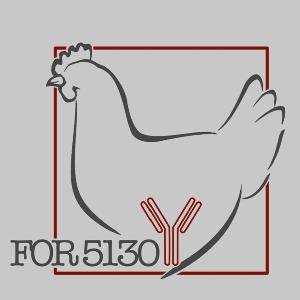ImmunoChick 2.0: Innovative research into immune defense in poultry
8 Jul 2025
8 Jul 2025

© LMU
Poultry is one of the most important sources of protein worldwide today, but at the same time it is under enormous pressure from infectious diseases. These infectious diseases not only cause considerable animal suffering, but also severely compromise animal welfare. In addition, chickens are a significant source of zoonotic pathogens that can be transmitted from animals to humans. Despite intensive research, little is known about the underlying mechanisms of disease development, the immune system, and the exact mechanism of vaccine protection in chickens.
The ImmunoChick research group, funded by the German Research Foundation (DFG), is making significant advances in basic and applied research in this field. The DFG has now approved the second phase of the project. Led by Professor Benedikt Kaufer (Freie Universität Berlin), ImmunoChick is investigating how the immune system of chickens responds to various pathogens in the context of infections. To this end, the scientists are using special chickens in which certain immune cells—known as B cells and T cells—have been specifically eliminated. Using modern methods such as proteome and genome analyses, they are investigating the immune responses to viruses such as avian influenza, Marek's disease, and Gumboro disease, as well as bacteria that cause salmonellosis. The aim is to gain a better understanding of the underlying mechanisms that influence the course and severity of diseases. This knowledge will help reduce animal suffering and improve vaccines in a more targeted manner.
At the LMU's Faculty of Veterinary Medicine, two projects are investigating fundamental aspects of antibody and T-cell responses in chickens, with a particular focus on the germinal center reaction and the characterization of virus-specific B- and T-cell receptors.
"ImmunoChick combines globally unique chicken models with cutting-edge research—for better vaccines, stronger animal health, greater protection against zoonotic diseases, and global food security," says PD Dr. Sonja Härtle from the Immunology Working Group of the Department of Veterinary Medicine at LMU and head of the subproject "Towards a Better Understanding of the Antibody Response in Chickens by Characterizing Germinal Center and Antigen-Specific B Cells." "This ambitious, multidisciplinary project is a milestone on the road to finally understanding the chicken's immune system, enabling the development of more effective vaccines, and significantly improving disease protection," adds Dr. Simon Früh, also from Veterinary Immunology and head of the project "Characterization of TFH Cells in Germinal Centers and Antigen-Specific T Cell Responses to Infectious Bursal Disease Virus in Chickens."